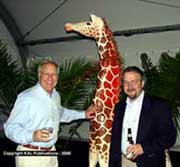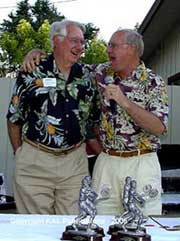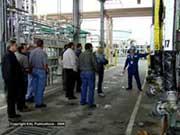
California Petroleum Conference

Commercial Fueling Network Meeting

Northern California Petroleum Industry Golf & Tennis Tournament

Tesoro Truck Rack Opening
Want to see the photos that didn't make the issue? Check out
the Cutting Room
Floor.
Chevron-Unocal Merger To Go Ahead
7-Eleven to Convert Colorado Convenience Stores
Valero to Retire Diamond Shamrock Brand
Giant Industries Acquires Dial Oil
Suncor Acquires Colorado Refining Company
ConocoPhillips Sells Tainted Fuel
SAN RAMON, CA. — After months of debate that transformed a business sale into an international discussion, the Chinese oil company China National Offshore Oil Company (Cnooc) Ltd., has withdrawn its offer for El Segundo-based Unocal Corporation.
With the withdrawal of the Chinese offer, it is expected that Chevron will have a clear path to acquire the exploration and production company.
Chevron Corporation had signed a merger agreement with Unocal in April which had been approved by the boards of both companies and the Federal Trade Commission. However, while waiting for stockholder approval, Cnooc came in an "unsolicited offer" for a greater amount to acquire Unocal.
The counteroffer by the Chinese company sparked a debate through the industry and into the halls of government. While the Boards of Unocal and Chevron both stood by their original agreement, stockholders were interested in the greater price for their stock offered by Cnooc. Members of Congress raised inquiries about the energy security concerns with selling Unocal, one of the major holders of petroleum reserves, to an offshore company instead of one based in the U.S.
In July, Chevron put a counteroffer on the table, increasing the amount that it would pay for Unocal: approximately 168 million shares of Chevron stock and pay approximately $7.5 billion in cash for a total value of approximately $18 billion.
While the counterbid was a concern for Cnooc, reportedly it was political pressure that was leading the Chinese company to withdraw its offer for Unocal. Members of Congress had been pressuring the Chinese government — which owns 70% of Cnooc — to withdraw the offer.
The issue will be taken up by Unocal stockholders at a special meeting of stockholders scheduled for Aug. 10.
DENVER, CO. — 7-Eleven has announced that they will be selling approximately 200 of its branded company-operated convenience stores in the greater Denver area.
The c-stores will be offered to operators and individual store managers who will have the first opportunity to buy the businesses and become 7-Eleven franchisees. If they choose not to buy the locations, members of the general public will be given the opportunity to buy the site and become the 7-Eleven franchisee.
The estimated cost to become a 7-Eleven franchisee and operate one of the c-stores would be approximately $120,000 — although 7-Eleven officials say that number can "vary significantly" depending on the store's location and local regulations.
7-Eleven locations in Denver, Louisville, Greeley, Lafayette, Longmont, Brighton, Fort Collins, and Colorado Springs are all on the block. An additional 32 7-Elevens in more rural locations will be kept as company-operated stores.
"We are offering the opportunity for people in the community to run their own business using a proven, successful system and with the support of the world's largest convenience retailer," said Scott Wohlman, 7-Eleven's franchise sales manager for Colorado.
SAN ANTONIO, TX. — Valero has announced that it will "retire" its Diamond Shamrock brand and convert all of its stations to the Valero image.
The conversion cost is estimated to be $70 million over the next two years with approximately 1,030 retail locations and 830 branded wholesale sites scheduled for rebranding. The majority of the locations impacted are in the Midwest but include sites in Colorado, Wyoming, New Mexico, and Arizona in the West.
Valero says it will still maintain its "value brands" of Shamrock and Beacon for smaller and lower volume stations. In addition, it will continue to use the Ultramar brand in Canada.
With the unification of Valero's 2,900 retail and jobber sites under the turquoise, yellow and white Valero brand, the oil company says it will have a national presence for the first time.
"We are very excited about having the Valero name on our retail and wholesale sites across the country," said Bill Greehey, Valero's CEO, announcing the company's plans. "There's a significant value to having our name in front of customers, potential investors, community leaders, business partners and media on a daily basis. We also believe that we'll capture synergies from supporting a single premier brand and realize greater benefits from our national advertising and sponsorships.
"We had a great response when we introduced the Valero brand in California in 2000," he added.
It is expected "the vast majority" of Diamond Shamrock stations will be rebranded by the end of 2006.
SCOTTSDALE, AZ. — Giant Industries has signed a deal to acquire Farmington, NM.-based jobber Dial Oil. The purchase price was undisclosed.
Dial will be operated as a wholly-owned subsidiary of Giant.
Included in the deal are Dial's operations in New Mexico, Nevada, Wyoming, and Arizona including 12 service stations, 16 cardlocks, four bulk plants, and a trucking fleet.
Announcing the deal, Giant's Chief Executive Officer Fred Holliger said, "Dial Oil is a good fit with our existing operations and provides us an opportunity to grow our wholesale business in the Southwest. Dial's wholesale fuel and lubricant markets strategically complement our Phoenix Fuel operations. The combination will geographically expand our existing markets and provide us with a platform for additional profitable growth. We also believe that synergies can be obtained by more effectively utilizing our Refining, Phoenix Fuel and Dial Oil transportation fleets."
He continued, "We believe that Dial's retail sites are well located and compliment Giant's existing retail stores in the Four Corners area. We further believe our marketing programs, when integrated with those of Dial's, will provide us excellent opportunities to continue to grow both fuel volume and merchandise sales."
The Dial's fuel needs will be supplied by Giant's refinery in New Mexico as well as third-party suppliers in the territory.
COMMERCE CITY, CO. — Suncor Energy has acquired the Colorado Refining Company from Valero Energy for approximately $30 million plus working capital and associated inventories.
Included in the deal are the 30,000 barrel per day refinery, located here, and a terminal in Grand Junction, Colorado.
The purchase is a strategic move for Canadian-based Suncor, which already operates a refinery in Denver. With the addition of the Valero refinery, Suncor will be the largest refiner in Colorado with a capacity of approximately 90,000 barrels per day.
"This acquisition provides an immediate expansion of our presence in the Rocky Mountain marketplace," said Rick George, Suncor's president and CEO, announcing the deal. "With a capacity of 90,000 barrels per day, the integrated operation is expected to be more competitive with refineries in Texas and Oklahoma," said George.
As part of the deal, Suncor is hiring Valero's 140 employees at the facilities and will continue to provide refined products to retail customers through Phillips 66 service stations in Colorado as well as offer unbranded fuel throughout the Rocky Mountain territory.
Suncor officials also noted that they were interested in continued downstream growth ' including buying other refineries or participating in joint ventures ' in the Rocky Mountains as part of a long-term market strategy.
SEATTLE, WA. — ConocoPhillips mistakenly distributed contaminated gasoline to jobbers and service stations in western Washington, causing automotive problems in 14 counties.
The tainted gasoline was manufactured at ConocoPhillips' Ferndale, WA., refinery and was distributed at the end of May and beginning of June. The fuel included a chemical that clogs fuel injectors. ConocoPhillips said they are investigating how the chemical mistakenly got into the fuel.
Service stations were the first to become aware of the problem when they received customer complaints. The customers said that their cars were sputtering, had rough idling, or the engine was "missing" after filing up at the company's 76-branded stations.
ConocoPhillips said that they will pay for repairs on vehicles with fuel injectors clogged by bad gasoline if they are taken to authorized dealerships.
The company also tested — and removed, where appropriate — gasoline from all of its stations in western Washington. Approximately 300 gasoline stations were involved.
Originally published in the August 2005 issue of O&A Marketing News.
Copyright 2005 by KAL Publications Inc.
Serving the 13 Western States, the World's Largest Gasoline, Oil, Fuel, TBA and Automotive Service Market